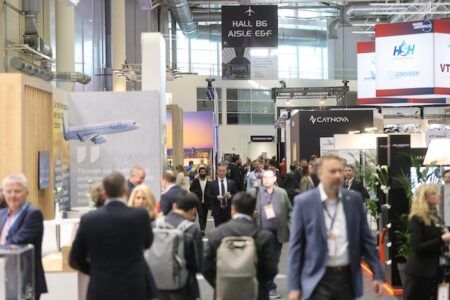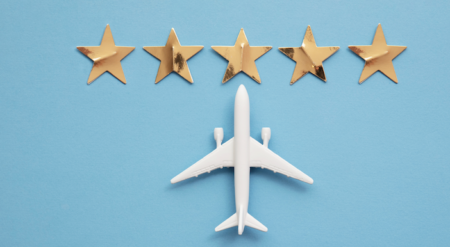Innovation and consolidation have shaped and narrowed the playing field in the aircraft interiors industry, and the aircraft catering business has evolved in much the same way.
With regards to interiors, Airbus and Boeing have pushed responsibility down onto tier-one suppliers to increase production speed and reduce operational complexity. Those tier-one suppliers in have in turn diversified, snapping up competitors and building out service portfolios to demonstrate leadership, adaptability and the capacity to grow with demand.
Airline catering companies have also exhibited great dexterity, becoming essential to their airline customers. So much so, that the term ‘airline caterer’ is now something of a misnomer. To thrive in the rapidly changing and passenger-centric world of commercial aviation, airlines and caterers must think fast, react, and never miss an opportunity to diversify.
Model planes
“Be undeniably good. No marketing effort or social media buzzword can be a substitute for that” – Anthony Volodkin, Hype Machine founder
From five-star inflight service that pushes the boundaries of luxury and indulgence, to low-cost thriftiness that tests the meaning of the word ‘basic’ – the spectrum of modern airline business models is vast and each airline is looking to stake its claim on a niche. The caterer helps its airline customers define that niche. It is now an advisor, an analyst, a marketer, a trend-watcher, a forecaster, a procurement expert, a designer, a logistics firm, and so much more. Oh, and did we mention food?
“Airline catering has changed in parallel to the airline industry,” says David de la Torre (pictured left), chief commercial officer at Gategroup, a leading global airline caterer. “Years ago, differentiation was based largely on premium offerings, whereas today cost is a fundamental driver for our business. Today, people are traveling across the world at very low fares. However, offering services at a low cost is not enough. Innovation, technology and retail are critical to staying ahead in the market and to continuing growth.”
Some airlines continue the traditional practice of bundling ancillary services into ticket price, while others sell seats for a song and charge the passenger for everything and anything else. Then there is a whole subset of airlines working from models that fall somewhere in-between.
“As low-cost airlines began to grow and legacy carriers felt the need to differentiate in this new highly competitive environment, catering requirements changed significantly,” explains Erdmann Rauer (pictured right), CEO of LSG Sky Chefs, a Lufthansa Group subsidiary and the largest airline caterer in the world. “Today they range from innovative onboard retail programs coupled with inflight entertainment options, to hybrid concepts combining onboard retail and complimentary service (depending on class or fare), and high-end culinary experiences designed according to the individual needs of passengers and consumers.”
Turning the key
“If you deprive yourself of outsourcing and your competitors do not, you’re putting yourself out of business” – Lee Kuan Yew, Prime Minister of Singapore (1959-2015)
Running an airline is already hard work. Now factor in the specific demands of passengers, food trends, tech trends, menu design, equipment specification, retail models and the plethora of other ‘soft product’ considerations that come along with it.
Things just got a lot harder.
A competent airline caterer with a well-rounded portfolio of products and services can be an airline’s saving grace.
“If you look at the 400 or so airlines in the world, there are very few still operating their own inflight kitchen or their own buy-on-board or duty free,” says Pierre Brugere (pictured left), vice president of commercial and marketing at Newrest, a quickly expanding France-based caterer of airlines with an interesting green-field growth strategy.
“I would say 80% of the market has already been outsourced and the remaining 20% is still there for political reasons or because it’s just not a focus for the airline at the moment. This trend is already somewhat behind us and you won’t see a reversal because the airline’s real business is to put a pilot and crew on an airplane and fly people from A to B,” Brugere adds.
Below: LSG’s highloaders are a familiar sight at airports, but represent only part of the company’s activities
LSG Sky Chefs has a number of business units and subsidiaries positioned to look after any inflight need. For amenities and equipment there is Spiriant, while Retail inMotion and Media inMotion provide smart retailing solutions and the technology required to deliver them. A partnership with Kuehne & Nagel called SkylogistiX provides shipping solutions, and another partnership with Oakfield Farms Solutions gives airlines a broad selection of custom, packaged meal options.
“A turnkey solution certainly offers the airlines more peace of mind because it reduces the number of interfaces they have to deal with,” says Rauer. “Working within a holistic approach, [airlines] can take advantage of an orchestrated package of products and services.”
Gategroup is currently looking to simplify operations through standardization and by streamlining corporate structure (one pillar of the company’s Gateway 2020 corporate strategy), but remains dedicated to providing a full suite of solutions and services as well. They too have a host of units, like Harmony for equipment, Pourshins/Supplair for procurement and logistics eGate Solutions for payments and data collection.
“In my view, this is a huge value add for airlines …[which] need to focus on their core business and retain market positioning in a very demanding and competitive market,” says de la Torre.
Below: Inflight retail and payments are growing markets for Gategroup
Tech talk
“The first rule of any technology used in a business is that automation applied to an efficient operation will magnify the efficiency. The second is that automation applied to an inefficient operation will magnify the inefficiency” – Bill Gates, founder of Microsoft.
The travel sector has gone digital, but many airlines still struggle to apply the latest trends in online booking, pre-ordering, personal entertainment, retailing and payments to their operations. As non-seat revenue becomes ever-more critical to the bottom line, airlines will lean heavily on catering organizations to provide digital platforms that consumers respond to – while using that same technological know-how to streamline operations, manage inventories and create data-based customer profiles for targeted offers.
One example of a step forward here is eGate Solutions’ software solution, TS, which could bring Apply Pay to the cabin. As smart wallets and touchless payment becomes increasingly popular on the ground, passengers are naturally keen to this technology in the air.
Likewise signaling the key role of technology in passenger experience and ancillary revenue, Dublin-based inflight retail expert Retail inMotion and its sister company Media inMotion, a UK-based provider of inflight entertainment and retail software, have been acquired by LSG Sky Chefs. The incorporation of Media inMotion particularly (a company that also produces IFE hardware solutions) speaks volumes about the weight LSG Sky Chefs puts on technology in the new catering and onboard retail environment.
“Today we can get essentially anything we want with just a few finger taps and slides on our smartphones,” says Rauer, who feels that digitization is far and away the leading trend affecting aviation today. “This capacity has changed our business dramatically. We have to take advantage of the many opportunities [technology] offers, whether it is through pre-ordering, offering an unlimited variety of services and products onboard that can capture the audience’s attention, or by collecting data and consumer insight via feedback tools. Through digitalization, we are also able to understand consumer needs much better and turn them into concepts that will enhance and individualize the passenger and consumer experience.”
Beyond the airstrip
“Without continual growth and progress, such words as improvement, achievement, and success have no meaning” – Benjamin Franklin, author, politician, theorist and inventor.
One might think the world’s 100,000+ scheduled daily flights would be enough to keep our catering giants busy, but it simply isn’t so. Each company we spoke with has truly global ambitions and a unique growth strategy that might include a combination of rail retail and catering, first and business class lounge service, airport concessions, institutional catering, remote site and event catering, convenience retail and even fast food, in addition to airline supply activities.
Newrest Group, for example, earns roughly 48% of its annual turnover from inflight catering – an activity that was once its only focus. Now at just 10 years of age, the company is involved in airline catering, remote site catering (think oil platforms at sea and mountain tops), rail, institutional catering (hospitals, schools, etc) and ‘retail’ in the form of airport and motorway concessions.
“We like to open up new countries with one of our five business units and then as soon as we have the management and purchasing teams in place, and the logistics network set up, we can extend from one business to another,” explains Brugere. “We used to work only in Europe, but now we are in North Africa and Africa, the Middle East and Gulf and Central and South America. We also have one of the largest rail contracts in the world with the French high-speed trains and we do day trains in Portugal, night trains in Austria, and some work with the Canadian National Railway.”
Below: LSG Sky Chefs has also made advances in rail catering, bagging significant contacts for creative service on Deutsche Bahn and Virgin Trains. The company also has grand designs on the North American retail/convenience market, which it feels is ripe for prosperity
“Our advantage in this market is that we have a USP (unique selling proposition) through our extensive network of about 40 facilities, which in contrast to our competitors who are only active at a local or regional level, are spread all over the nation,” divulges Rauer. “We have, and will continue to expand on an international scale alongside major players in convenience and retail. For example we are working with Starbucks in Canada, Chile and China and are exploring further potentials. Over the past we have doubles our revenues [in this segment] and we are confident this will continue in the U.S. and other markets.”
Gategroup has several success stories in providing food products to convenience stores, and will continue to explore that avenue where it meets strategic objectives, but Torres tells us that his company strategy is a little more linear.
“We have a clear target with our Gateway 2020 strategy to focus on the core airline catering business while also increasing our exposure to high-growth emerging markets and leading edge retail, innovation and technology,” he says. “We believe there is huge growth potential in our core business, especially through retail development, and we are therefore not actively pursuing the rail industry.”
Servair: Ripe for the picking?
Servair currently lays claim to the title of third-largest airline caterer globally. It is renowned for exquisite French haute cuisine, dedication to culinary excellence and a particularly strong presence in Africa. For many years the caterer has worked together with Joël Robuchon, the most starred chef in the world.
In our interview with Christian Leger, managing director of operations at Servair, he was keen to highlight the importance of onboard cuisine as a brand differentiator and is strongly focused on growth within aviation, not so much outside.
“A large part of what sets Servair apart is the insistence upon real cuisine in our centers, with teams of skilled and passionate chefs … It is important to us to keep close ties to the world of French haute cuisine, where we partner with various important institutions and where our chefs maintain professional and personal relationships,” Leger explains. “Our focus remains on airport strongholds in our area of expertise. We are not seeking to set up in city centers as we remain keen to ensure we can rely on our logistics, management and workforce.”
Servair left the rail catering sector behind in the 1990s and is not exceedingly active in retail or convenience. The company is cutting back on event catering contracts too, but there could be a good reason for all this.
In March 2015, Reuters reported that parent Air France-KLM was considering reducing its shareholding in the Servair catering unit. At that time, sources revealed to Reuters that French bank BNP Paribas had already been mandated to oversee the sale.
In our own interview with Newrest for this story, Brugere revealed that Newrest has made a bid to purchase a significant portion of Servair.
“We are running for the acquisition of Servair, we are in the list of companies,” he told us. “If you look at their network, you will understand why. There is only one overlap in Africa.”
That overlap is Newrest and Servair.
“The key to making acquisitions is being ready, because you never really know when the big one is going to come along” – James McNerney, chairman, The Boeing Company.
Food by numbers
Here’s a quick look at the world’s top airline catering companies and who they’ve been buying lately.
LSG Sky Chefs (2014 figures)
Employees: ca. 33,000
Consolidated revenues (group): €2.6bn
Airlines customers: ca. 300
Countries present in: 51
Meals served: 578m
Recently acquired: Retail inMotion & Media inMotion, airline retail and user experience specialists in UK and Ireland
Gategroup (2014 figures)
Employees: ca. 28,000
Consolidated revenues (group): €615.43m
Airline customers: ca. 270
Countries present in: 32
Meals served: ca. 350m
Recently acquired: Inflight Service Group (IFS), a leading buy-on-board provider in Europe, with focus on the Baltics.
Newrest Group (2014 figures)
Employees: ca. 28,000
Consolidated revenues (group): ca. €1.4bn
Number of airline contracts (not unique customers): 617
Countries present in: 49
Meals served: 430,000 per day
Recent acquisitions: Wagon-Lits (French train caterer, hotel and logistics provider), Newrest First Catering (JV w/First Catering in Africa)
Servair (2014 figures)
Employees: ca. 28,000
Consolidated revenues: ca. €1.4bn
Number of airline customers: 120
Countries present in: 26
Meals served: 560,000 per day
Recent acquisitions: Majority stake in Panima (Mayotte-based contract caterer)




